|
|
|
Sort Order |
|
|
|
Items / Page
|
|
|
|
|
|
|
| Srl | Item |
| 1 |
ID:
078838


|
|
|
|
|
| Publication |
2007.
|
| Summary/Abstract |
This paper addresses a puzzle of how conflicts characterized by significant power asymmetries often play out much differently than dominant powers expect. We adapt the notions of institutionalized peace and riot systems from the literature on ethnic violence to identify ways in which social institutions attenuate collective action dilemmas, thereby increasing capability for a less-powerful group. Dominant groups often miscalculate the true nature of capability relationships by failing to account for these group-specific institutions that operate in the face of exogenous threats. We illustrate our model with two episodes of Chechen mobilization in the 1990s
|
|
|
|
|
|
|
|
|
|
|
|
|
|
|
|
| 2 |
ID:
124143
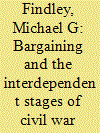

|
|
|
|
|
| Publication |
2013.
|
| Summary/Abstract |
This article examines civil war resolution as a process comprised of multiple interdependent stages. It engages directly the idea that peace emerges only as a process comprised of battle, negotiation, agreement, and implementation of an agreement. I hypothesize that events at earlier stages of the peace process have implications for later stages, but not always in the same ways. Drawing on bargaining models of war, I consider how two factors that might prevent successful bargaining-stalemates and the number of actors-can encourage cooperation early in a peace process but impede lasting cooperation at later stages. Using a nested dichotomies statistical approach to capture interdependence, I find support for the argument that stalemates and the number of actors have different effects depending on the stage of the peace process. The results substantiate the need in theoretical and policy work to consider peace as an interdependent, sequential process.
|
|
|
|
|
|
|
|
|
|
|
|
|
|
|
|
| 3 |
ID:
185671


|
|
|
|
|
| Summary/Abstract |
Scholars have long examined the relationship between natural resources and conflict at the country level. More recently, researchers have turned to subnational analyses, using either individual countries or subnational data for a small number of resources in sub-Saharan Africa. We introduce a new sub-national dataset of 197 resources that adds many resource types, locations, and countries from Africa, the Middle East, Asia, Latin America, and Europe. To demonstrate the value of the new dataset, we examine how conflict incidence varies with the value of the collective set of resources in a given location using world prices. We then introduce new country-specific price data, which are more relevant for conflict dynamics. Since country-specific prices can be endogenous to conflict, we instrument country-specific prices using U.S. and world prices. We find that sub-national resource wealth is associated with higher levels of conflict using some specifications, though the results vary widely by data source and world region. Using an instrumental variables strategy lends the strongest support to this positive relationship, but only for African countries. Notably, across all of our models, we find that resources are negatively associated with conflict in Latin America, suggesting heterogeneity of effects worth future exploration.
|
|
|
|
|
|
|
|
|
|
|
|
|
|
|
|
| 4 |
ID:
143321
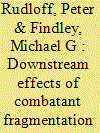

|
|
|
|
|
| Summary/Abstract |
We consider whether the fragmentation of combatants during civil war has downstream effects on the durability of peace following civil wars. We contend that the splintering of combatant groups, a primary manifestation of rebel group fragmentation, produces potential spoiler groups that are neither incidental nor unimportant in the process of civil war resolution. Making connections to the spoiling and credible commitment literatures, we hypothesize that rebel splintering hastens the recurrence of civil wars. Using event history modeling and propensity score matching to analyze two different civil war datasets, we examine whether the occurrence of fragmentation during a civil war influences the length of peace after the civil war. The empirical analysis of fragmentation events during civil wars since World War II offers support for the hypothesis that splintering decreases the duration of post-civil war peace. The results suggest the need to pay closer attention to the dynamics of fragmentation, and particularly how these dynamics lead to future consequences – even when those consequences take place after the war has concluded. For example, governments that attempt to splinter groups or to use existing fragmentations within rebel groups to end a civil war may encourage the unintended consequence of shorter peace duration.
|
|
|
|
|
|
|
|
|
|
|
|
|
|
|
|
| 5 |
ID:
081515


|
|
|
|
|
| Publication |
2007.
|
| Summary/Abstract |
From as early as the Roman Empire to the present day, governments have grappled with how best to respond to political violence from organized insurgent groups. In response to insurgent groups, some governments have emphasized a direct military response or what is often called 'attrition'. Other states have stressed a softer, political strategy or what is often called the 'hearts and minds' approach. Either approach places the population at the center of a struggle between the government and violent dissidents. Despite numerous works emphasizing either 'attrition' or 'hearts and minds', few theoretical studies have attempted to compare their relative success. Using an agent-based computational model, we examine which approach is more successful at quelling insurgencies and find that a hearts and minds approach is superior to an attrition strategy. We illustrate the model with insights from the Iraqi insurgency and, more generally, the model has implications for other insurgencies, such as in Chechnya.
|
|
|
|
|
|
|
|
|
|
|
|
|
|
|
|
| 6 |
ID:
128956
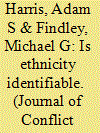

|
|
|
|
|
| Publication |
2014.
|
| Summary/Abstract |
Ethnicity is frequently posited as an important factor in civil violence and other political contexts. Despite the attention that ethnicity receives, its effects depend on an important, but mostly ignored, assumption that ethnicity is identifiable within and across groups. There is likely considerable variation in peoples' abilities to identify each other. Certain individuals within groups might be better at identifying others' ethnicities; further, different types of information might aid identification better. We contend that the strength of an individual's ethnic identity influences her ability to identify others correctly. We test this argument using an experiment in the Eastern Cape of South Africa in which individuals attempted to identify members of the major black ethnic groups. We find that the average individual struggles to identify ethnicity correctly in many conditions. Individuals with a stronger identity, however, are often better at correctly identifying the ethnicity of others relative to the average individual. When receiving contradictory information, individuals with stronger identities were sometimes deceived more easily than others. These results have implications for a diverse set of studies relying on the identifiability assumption.
|
|
|
|
|
|
|
|
|
|
|
|
|
|
|
|
| 7 |
ID:
102511
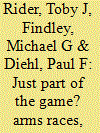

|
|
|
|
|
| Publication |
2011.
|
| Summary/Abstract |
In this study, we look at the relationship of arms races to war, with appropriate consideration of rivalries. Are arms races more common in rivalries than in lesser competitions? Are they merely a consequence of rivalry competitions? How do the patterns of arms races map with those of war in rivalries? We explore these concerns with an empirical examination of rivalry and non-rivalry populations in the 1816-2000 period. In brief, we find that: arms races occur most frequently in the context of enduring rivalries; arms races are more likely in the middle and later stages of rivalry; the frequency of arms races is higher in rivalries with war than rivalries that do not experience war; and only when arms races occur in the later phases of rivalries is there an increased chance of war. Our study narrows the scope of the arms race-war relationship relative to past studies, demonstrating that the arms race-war relationship is conditional on rivalry processes.
|
|
|
|
|
|
|
|
|
|
|
|
|
|
|
|
| 8 |
ID:
116339
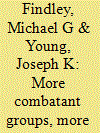

|
|
|
|
|
| Publication |
2012.
|
| Summary/Abstract |
We examine and test the logic that outbidding among insurgent groups results in more suicide terrorism specifically and more terrorism of any type, which has become a popular argument in recent years. A global analysis of terrorism from 1970-2004 provides scant support for the notion that outbidding increases suicide terrorism. An extension of the argument to all types of terrorist attacks provides even less support. The logic of outbidding has received considerable attention in academic and policy circles in recent years. 1
Similar to the argument that democratic occupation increases suicide terror, 2 our lack of empirical support suggests that considerable cross-national work is still needed to understand suicide terror adequately. We suggest some reasons why this may be the case, drawing particular attention to the problem of overgeneralizing from a limited set of cases.
|
|
|
|
|
|
|
|
|
|
|
|
|
|
|
|
| 9 |
ID:
152815
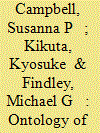

|
|
|
|
|
| Summary/Abstract |
International relations scholarship on intrastate peace and conflict largely conceptualizes peace as an absence of war and, to some extent, the presence of a minimal degree of democracy. Empirically, scholars treat peace as a non-event, identifying it as the absence of military battles rather than (or in addition to) the presence of conflict-mitigating institutions or activities. This approach hearkens back to a bygone debate about negative and positive peace, and illustrates that negative peace conceptualizations dominate existing scholarship. In this article, we unpack the conceptual foundations of peace to account more fully for cooperation, rather than just violent conflict. We then operationalize this expanded conceptualization of peace through a latent variable measurement approach that carefully aggregates both conflict and cooperation events. We ground the measurement model in data from Colombia for the period of 1993 to 2012. In so doing, we present a new, empirically grounded ontology of peace that we expect could be useful for causal theorizing and testing in other work.
|
|
|
|
|
|
|
|
|
|
|
|
|
|
|
|
| 10 |
ID:
108033
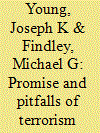

|
|
|
|
|
| Publication |
2011.
|
| Summary/Abstract |
Using a database of recent articles published in prominent political science journals, we show the rapid increase in terrorism research. Given this increased awareness and attention, we identify several problems that still plague the study of political terrorism including definitional problems that lack empirical tests, not distinguishing among different types of terrorism, and using the wrong unit of analysis when designing research. After identifying these problems-especially as they relate to the quantitative study of terrorism-we suggest some solutions. We then apply these suggestions to investigate whether changing the definition of terrorism, different types of terrorism, or changing the unit of analysis affects key predictors of terror events cross-nationally. One of our tests consists of varying the unit of observation to include directed dyads, which offers the potential to test some of the many strategic models of terrorism. Our analysis suggests that varying definitions of terrorism, such as military vs. non-military targets, might not be that consequential, whereas different types of terrorism, such as domestic vs. transnational, could be driven by fundamentally different processes. We also conclude that modeling transnational terrorism differently using directed dyads yields new and interesting insights into the process of terrorism.
|
|
|
|
|
|
|
|
|
|
|
|
|
|
|
|
| 11 |
ID:
121585


|
|
|
|
|
| Publication |
2012.
|
| Summary/Abstract |
What is the relationship between civil war and terrorism? Most current research on these topics either explicitly or implicitly separates the two, in spite of compelling reasons to consider them together. In this paper, we examine the extent to which terrorism and civil war overlap and then unpack various temporal and spatial patterns. To accomplish this, we use newly geo-referenced terror event data to offer a global overview of where and when terrorist events happen and whether they occur inside or outside of civil war zones. Furthermore, we conduct an exploratory analysis of six separate cases that have elements of comparability but also occur in unique contexts, which illustrate some of the patterns in terrorism and civil war. The data show a high degree of overlap between terrorism and ongoing civil war and, further, indicate that a substantial amount of terrorism occurs prior to civil wars in Latin America, but yet follows civil war in other regions of the world. While the study of terrorism and of civil war mostly occurs in separate scholarly communities, we argue for more work that incorporates insights from each research program and we offer a possibility for future research by considering how geo-referenced terror and civil war data may be utilized together. More generally, we expect these results to apply to a wide variety of attitudes and behaviors in contentious politics.
|
|
|
|
|
|
|
|
|
|
|
|
|
|
|
|
| 12 |
ID:
105879
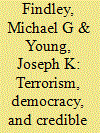

|
|
|
|
|
| Publication |
2011.
|
| Summary/Abstract |
What explains the variation in terrorism within and across political regimes? We contend that terrorism is most likely to occur in contexts in which governments cannot credibly restrain themselves from abusing their power in the future. We consider a specific institutional arrangement, whether a state has an independent judiciary, and hypothesize that independent judiciaries make government commitments more credible, thereby providing less incentive for the use of terrorism. Using a recently released database that includes transnational and domestic terrorist events from 1970 to 1997, we estimate a set of statistical analyses appropriate for the challenges of terrorism data and then examine the robustness of the results. The results provide support for the credible commitment logic and offer insights into the different ways that political institutions increase or decrease terrorism.
|
|
|
|
|
|
|
|
|
|
|
|
|
|
|
|
| 13 |
ID:
107808
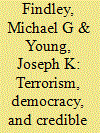

|
|
|
|
|
| Publication |
2011.
|
| Summary/Abstract |
What explains the variation in terrorism within and across political regimes? We contend that terrorism is most likely to occur in contexts in which governments cannot credibly restrain themselves from abusing their power in the future. We consider a specific institutional arrangement, whether a state has an independent judiciary, and hypothesize that independent judiciaries make government commitments more credible, thereby providing less incentive for the use of terrorism. Using a recently released database that includes transnational and domestic terrorist events from 1970 to 1997, we estimate a set of statistical analyses appropriate for the challenges of terrorism data and then examine the robustness of the results. The results provide support for the credible commitment logic and offer insights into the different ways that political institutions increase or decrease terrorism.
|
|
|
|
|
|
|
|
|
|
|
|
|
|
|
|
| 14 |
ID:
124383
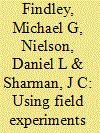

|
|
|
|
|
| Publication |
2013,
|
| Summary/Abstract |
Efforts to fight international money laundering, corruption, and terrorist financing depend crucially on the prohibition barring the formation of anonymous shell companies+ To study the effectiveness of this prohibition, we perform the first international relations ~IR! field experiment on a global scale+ With university institutional review board ~IRB! clearance, we posed as consultants requesting confidential incorporation from 1,264 firms in 182 countries+ Testing arguments drawn from IR theory, we probe the treatment effects of specifying ~1! the international standards ~managerialism!, ~2! penalties for noncompliance with these standards ~rationalism!, ~3! the desire to follow norms through complying with international standards
|
|
|
|
|
|
|
|
|
|
|
|
|
|
|
|
| 15 |
ID:
156708
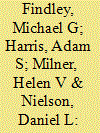

|
|
|
|
|
| Summary/Abstract |
Does foreign aid enable or constrain elite capture of public revenues? Reflecting on prominent debates in the foreign aid literature, we examine whether recipient preferences are consistent with a view that foreign donors wield substantial control over the flow of aid dollars, making elite capture more difficult and mass benefits more likely. We compare elite and mass support for foreign aid versus government spending on development projects through a survey experiment with behavioral outcomes. A key innovation is a parallel experiment on members of the Ugandan national parliament and a representative sample of Ugandan citizens. For two actual aid projects, we randomly assigned different funders to the projects. Significant treatment effects reveal that members of parliament support government programs over foreign aid, whereas citizens prefer aid over government. Donor control also implies that citizens should favor foreign aid more and elites less as their perceptions of government clientelism and corruption increase. We explore this and report on other alternative mechanisms. Effects for citizens and elites are most apparent for those perceiving significant government corruption, suggesting that both sets of subjects perceive significant donor control over aid.
|
|
|
|
|
|
|
|
|
|
|
|
|
|
|
|
|
|
|
|
|